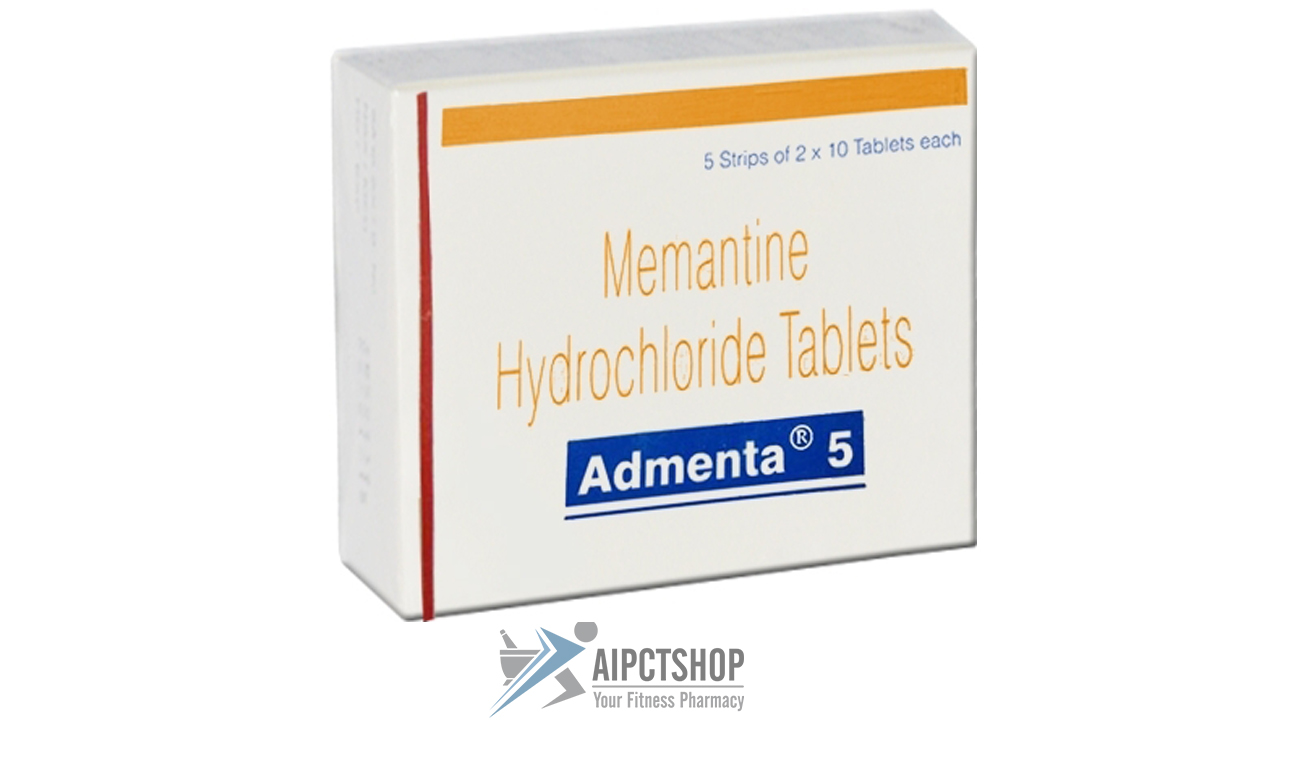Admenta 5 mg (Memantine)
Uses
How it works
What is Memantine?
Memantine is an Alzheimer?s Disease medication that reduces the actions of chemicals in the brain that may acts as factors in bringing about the symptoms of this disease. Memantine is prescribed for the treatment of moderate to severe dementia of the Alzheimer?s type.
Memantine is sold under various trade names, some of which are Namenda and Admenta (Sun Pharma). This medication may also be given for conditions not mentioned here.
Important Information about Memantine
Do not take Memantine (Namenda, Admenta) if you are allergic to it. Notify your doctor in advance if you are allergic to any other drugs or if you have any of the following conditions: epilepsy or seizure disorders, cataract, liver or kidney disease, or a bladder or kidney infection. Having any of these conditions may require dose adjustments from the normal dosage of this medication.
Memantine can impact your thinking and reflexes. Be extra careful when you drive or do activities which require a high degree of mental awareness. Memantine is an FDA pregnancy category B drug. It is not expected to be harmful to an unborn baby when taken during pregnancy. It is not known whether Memantine can pass into breast milk and harm a nursing baby. You must notify your doctor beforehand if you are pregnant, planning to become pregnant or breast feeding.
Before taking Memantine
Before taking Memantine, take care of all precautions and points mentioned above and discuss them with your doctor. Clarify any doubts you may have regarding this medication.
How should I take Memantine?
Take Memantine (Namenda, Admenta) exactly as prescribed by your doctor. All medications come with a patient leaflet with complete instructions and details. Refer it for any doubts. Do not alter the course of the medication in any way (do not take more or less than the prescribed dosage). Also do not take it after the period for which the medication was prescribed is over.
You may take Memantine with or without food. Take it with a full glass of water. Always store Memantine medication in a cool and dry place.
What if I forgot to take a dose of Memantine?
Do not miss a single dose of Memantine. However, if you miss a dose, take it as soon as your remember it. Do not take the missed dose if the time to take the next dose is almost up. Instead continue with the original schedule. Never take multiple doses closer to each other.
What to do in case of an Overdose?
In case of an overdose of Memantine, get emergency medical attention or call the Doctor immediately. Overdose may cause restlessness, drowsiness, unusual behavior, hallucinations, light headedness, or fainting.
Things and Activities to avoid while using Memantine
Follow any diet and activity restrictions advised by your doctor strictly, especially with regards to any activity that requires a high level of mental alertness. Memantine can impact your thinking ability and reflexes. This may make activities like driving daunting and tough, so be extra careful.
Memantine Side Effects
Some common and less serious side effects of Memantine are dizziness, hallucinations, confusion, loss of coordination, seizures, fainting, joint pain, anxiety, swelling in hands or feet, constipation, and headache. If any of these side effects continue for a long time and deteriorate, seek medical attention right away.
Memantine rarely causes any serious side effects but if you experience them, stop using the medication and get emergency medical attention. The side effects mentioned thus are not all the possible ones, there may be others.
Memantine Dosing Information
Memantine dosage will be decided by your doctor after properly examining you. However, the normal dosage is 5 mg orally once daily initially, then incremented by 5 mg per week. Maintenance dosage is 5 mg once daily up to 10 mg twice daily. The maximum daily dose of Memantine should not exceed 20 mg.
Interaction with other drugs
Some drugs can interact with Memantine. Let your doctor know in advance if you are using any of these medications already: cimetidine, nicotine, ranitidine, quinidine, sodium bicarbonate, anti viral drugs such as rimantadine or amantadine, cold or cough medicines that contain dextromethorphan, a diuretic which such as hydrochlorothiazide or triamterene, drugs to treat glaucoma such as acetazolamide or dichlorphenamide, or oral diabetes medications that contain metformin. These drugs are not all the possible ones which can interact with Memantine. There may be others. Let your doctor know about all other drugs which you may be using. Never start a new medication without proper medical screening and advice.
Expert advice
- Do not start or continue the memantine if you are allergic to memantine or any of other ingredient in the medicine.
- Do not take memantine if you have history of fits (convulsions or seizures); heart disorders.
- Avoid taking memantine if you are pregnant or breastfeeding.
- Do not take memantine if you have recently changed or intend to change your diet substantially (e.g. from normal diet to strict vegetarian diet).
- Do not take memantine if you are suffering from states of renal tubulary acidosis (an excess of acid-forming substances in the blood due to poor kidney function); severe infections of the urinary tract.
Frequently asked questions
Memantine
Disclaimer
We provide only general information about medications which does not cover all directions, possible drug integrations, or precautions. Information at the site cannot be used for self-treatment and self-diagnosis. Any specific instructions for a particular patient should be agreed with your health care adviser or doctor in charge of the case. We disclaim reliability of this information and mistakes it could contain. We are not responsible for any direct, indirect, special or other indirect damage as a result of any use of the information on this site and also for consequences of self-treatment.








Reviews
There are no reviews yet